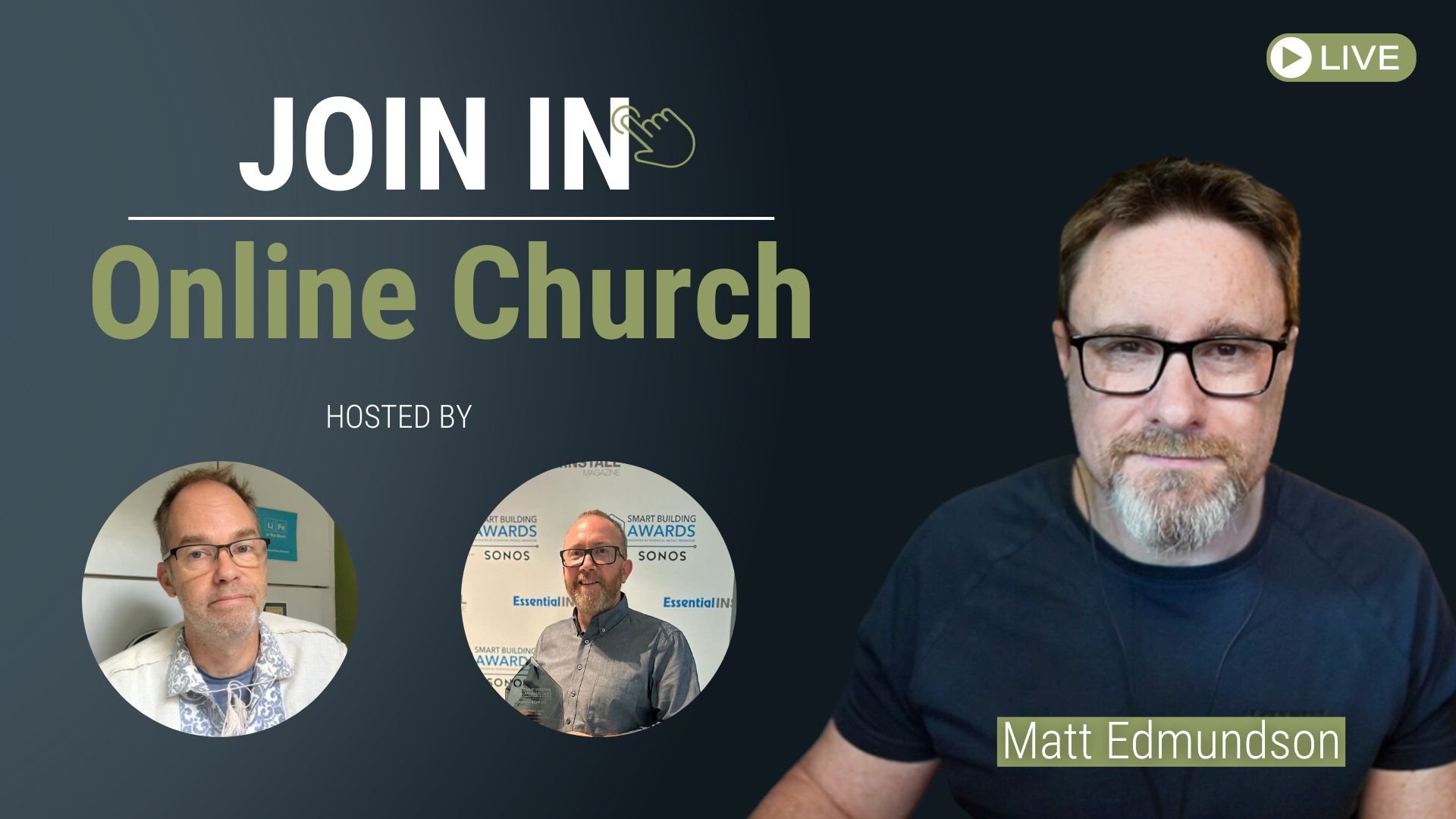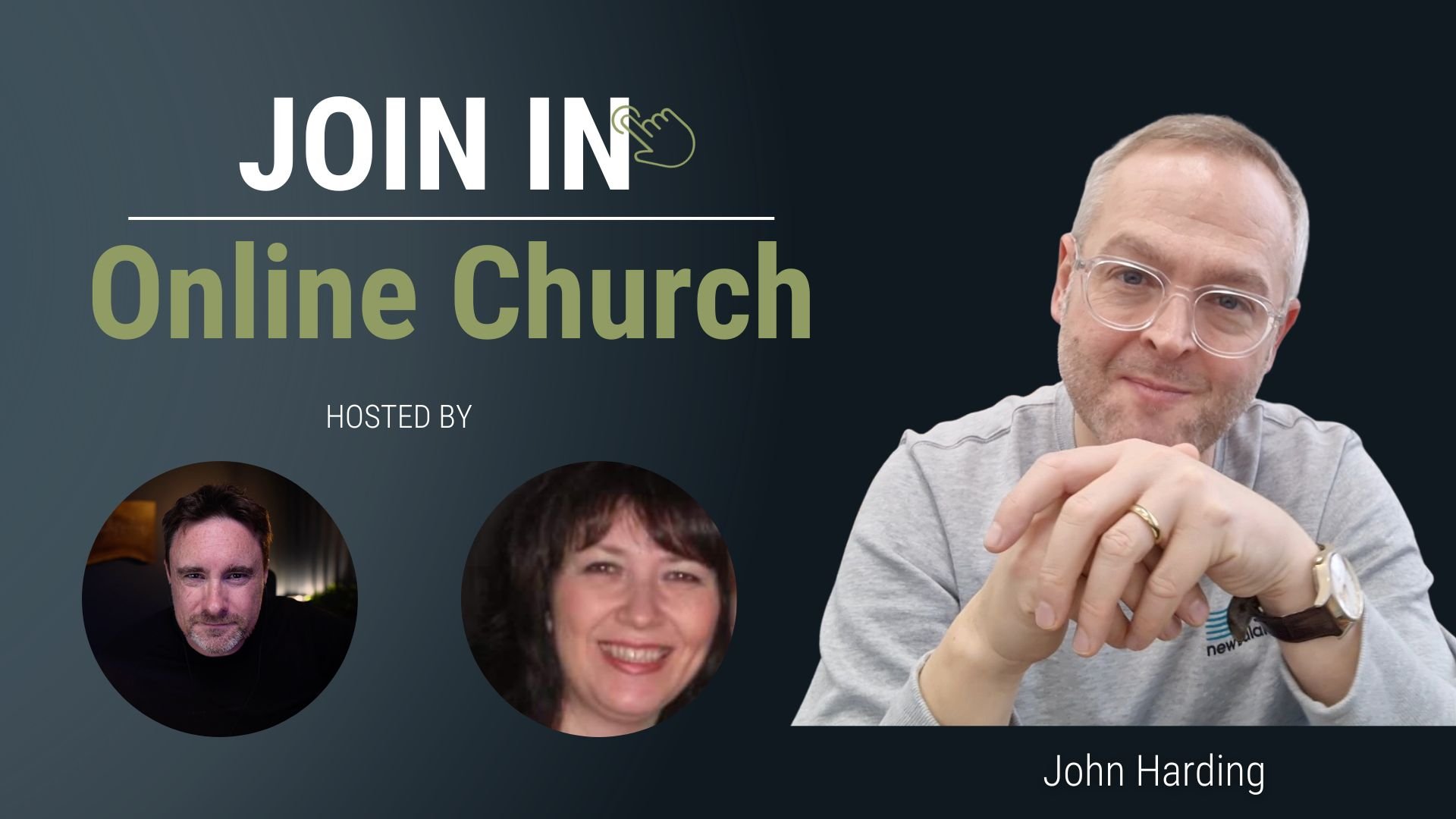A Bigger Jesus
Video Timeline
WELCOME
TALK with John Harding
WORSHIP
CONVERSATION STREET with Dan, Chris and Sue
A Bigger Jesus
— John Harding
We read in the gospel of John, chapter 1,
“In the beginning was the Word, and the Word was with God, and the Word was God. He was with God in the beginning. Through him all things were made; without him nothing was made that has been made. In him was life, and that life was the light of all mankind. The light shines in the darkness, and the darkness has not overcome it.”
“The true light that gives light to everyone was coming into the world. He was in the world, and though the world was made through him, the world did not recognize him. He came to that which was his own, but his own did not receive him. Yet to all who did receive him, to those who believed in his name, he gave the right to become children of God— children born not of natural descent, nor of human decision or a husband’s will, but born of God.”
This is how a man called John starts his biography of the life of his friend, Jesus. Now, wonder if someone, maybe a friend of yours was to write up your life story, your biography. I wonder how they would start it. I suppose it depends a little bit on how well they knew you. Maybe if someone, let's say my brother, was writing my biography, not that he would. I'm simply not that interesting or exceptional or influential, but if he were to write my biography, he'd probably say something like this.
John Harding was born on March 25th, 1977 into a working-class family in a Northern pit mining town.
That might be how he would start it. Now let's say I had four friends, all writing my biography. Not that they would, I don't have that sort of status, but let's say they did. They all might write something very similar to each other. Unless one of my friends, the creative, poetic, mystical, abstract, a little bit weird one, you know who you are, unless that friend took a completely different approach. Totally true. As true as the other biographies, but different. Unexpected. A little bit "left of field". And that's like John's gospel.
Matthew, Mark, and Luke all write pretty similar biographies of the life of Jesus. Matthew starts with Jesus' genealogy, his family tree, and he traces Jesus' origins back to Abraham, the father of Judaism, to show that Jesus is the promised Jewish Messiah, the long-awaited king, to follow David. Mark starts his biography of Jesus with an ancient prophecy from Isaiah to show how John the Baptist would prepare the way for the coming king, for Jesus. Luke, a doctor, starts his biography of Jesus listing his research, his methodology, who he's interviewed, and how he's done a thorough investigation. Luke, the methodical, scientific, precise one.
And then John says, using the language of Genesis chapter 1, the language of the creation of the world, he says, in the beginning was the word, and the word was with God, and the word was God. He was with God in the beginning. John's taken a completely different perspective and approach and chronology in writing about his friend, Jesus, but don't miss the point. There are four gospels, but actually there's only one gospel, one four-fold gospel, the most read biographies ever written.
Why write about Jesus?
No one's ever gonna write my biography, but these four men put pen to paper because they had encountered the most remarkable, the most influential, the most important, and unique person imaginable. They met Jesus. Jesus changed their lives. They wanted the world to know it. And so they recorded in their own words, in their own way, from their own perspective, the story of who Jesus was.
And John, writing in the form of mystical Jewish poetry, he starts by saying, you know the creation of the world. And you know how there was nothing, nothing but God. And you know how God spoke the word light and light came into the world and you know how God spoke the word land, and sea, and sky and land, sea, and sky came into being at the sound of the word.
John's saying, I've come to realize and believe that that word, in the beginning, was a person. And that person was Jesus Christ. Jesus was there before the beginning of time or space. He was with God, the Father and God, the Spirit because he was God. He was God, the word, speaking into being a creation, from nothing to something. And so through him, as we've read, all things were made. That's the revelation of Jesus that John wanted to share with us. No wonder he wants to put pen to paper or papyrus.
Who is Jesus?
Before we write this off as some ancient myth and therefore irrelevant to our modern scientific world and our modern, sophisticated understanding, I want you to see that John captures a deep and profound truth. One, simply beyond the remit and limits even of modern science. The truth that he captures is this.
Now, there is something. There is matter, time, space, and light, but once there was nothing. And for something to come from nothing, there needed to be something, someone outside of time and space, something distinct from matter and creation, something not physical, not contingent. And John calls that something, Jesus, the pre-existent word, God.
It's mind-blowing stuff, ancient cosmology that responds to modern scientific questions.
People, many people, in fact, reading John's biography of the life of Jesus, can see that Jesus is special, unique, unlike any other person that has ever walked the face of this planet. But here in our reading, John explains why. He gives us the most compelling reason why Jesus is so unique. And it's this.
Jesus always has been. Jesus always will be. He is distinct, superior to, above and beyond the created order, above and beyond matter, light, time, space, and all that stuff around you. The screen that you are watching or holding, the seat that you are sat on, the body that you are inhabiting, the time that is passing as you read, the space that you're occupying, all of that once was not. And all of it will cease to be. But Jesus is outside of that. He was before all of that, the word, in the beginning, the uncaused cause, the unmoved mover.
And John is saying to us, you know, why the life of Jesus is so unique, so different, so captivating, so life-changing? Well for this reason. The life of Jesus on earth is the story of what happens, what you get when you take a pre-existing creator, God who wraps himself in human flesh and blood, human matter and limits himself to 33 years in human years, walking upon the face of this planet, literally from the highest heaven to the lowest physical place on earth. John is gonna go on to say, the word became flesh and dwelt amongst us. No wonder 2000 years later, we are still captivated by this Jesus. We're still talking about him. We're still encountering him. We're still being transformed by him. This is the Jesus that John is introducing to us in his biography, John 1.
I wonder, have you encountered this Jesus?
Jesus, The Life
John goes on to say that this Jesus, the pre-existent creating word, this Jesus, in him was life. Now, how should we understand that? What does that mean when we read that "in Jesus was life?"
Well, let me say right off the bat here, that it's a statement bigger than our understanding. It's sort of beyond us. But when we grasp around for some meaning, and when we try and make sense of it, we're gonna land on some thoughts that are some of the most powerful ideas we will ever explore. We're gonna be answering, and responding to some questions that are some of the most important questions that we will ever ask.
Like, how do we find real life? How do we really live this life that we have? How can we embrace and experience more life, and a better quality of life? We will find the answer to life, not in more education or more information, not in the right type of relationship with another person or through more experiences or some sort of philosophy or theory.
John says no. No, life is found in Jesus. Jesus, the pre-existent word who spoke matter and time and space into being, the one ultimately responsible for creating you. John says, in him was life. In Jesus we find life.
Now on one level, that's saying, well, we tend to think of the physical - matter, atoms, elements, protons, this primordial suit. We tend to think of matter developing into life. But John, writing 2000 years ago, says, no, it doesn't work like that. It's the other way round, it's life leading to matter. The only reason that we have something rather than nothing, the only reason that that something is ordered, not chaotic. The only reason we have life is that Jesus, the word was there in the beginning, orchestrating it all.
And so, that's why as a Christian, I am absolutely convinced of this one truth more than anything else, that when you find Jesus, you find life. When you encounter Jesus, you encounter life. In Jesus is life. And because Jesus is the source and origin and author of life, that means you are always gonna lack a sense of being truly alive apart from Jesus, the author of life.
Our reading from John 1 ends with these words, Jesus was in the world. And though the world was made through him, the world did not recognize him. He came to his own people, but they didn't receive him. Yet to all who received him, to all who believed in his name, he gave the right to become children of God.
Jesus, the pre-existent God, the one who spoke and brought forth something from nothing. Jesus came into this world. But as amazing as that is, it wasn't immediately obvious. Not everyone could see Jesus for who he really was. Some overlooked him. Some rejected him, some reacted so badly, so negatively, that they had him killed, crucified as if you could ever really kill the word made flesh in whom was all life. But that is what they did. At least he allowed them to take his life from him for three whole days. His own people, the Jewish people, did not receive him. They rejected him. But then we read these incredible words.
Yet to all who did receive him, to those who believed in his name, he gave the right to become children of God…
That's how we get life. That's how we experience real life. I'm talking about real life, quality life, life that lifts us up out the rat race, life that gives meaning and dignity and purpose, we get that sort of life by receiving Jesus and believing in Jesus.
Receive Jesus, the source of life. Believe in Jesus, the source of life, and something's gonna happen. The only way John, the author of this biography can describe it is he says, it's like this, that when you receive Jesus, when you believe in Jesus, you get born into God's family. We truly become children of God. And so the life that flowed through Jesus' veins becomes the life flowing through ours. We share in his nature because we are his children. Jesus existed before and was separate from time, matter and space. And he spoke those things into being. He's the source of life. So receive him, believe in him. And in doing so, you will find his life.
Conclusion
I often say to Christians that how you see God, how you behold God, radically impacts how you believe and how you behave.
Behold, believe, behave.
Get your beholding right. Get your gaze right. Get your vision right. And you'll find you start to live in a transformed way. Well, John had a vision, a revelation, an experience of who Jesus really was. It's a little bit bigger than some of us tend to think of Jesus and we reduce him down. Get a bigger vision of Jesus, the pre-existent word, the one in whom there is all life. And you will find that you experience more of his life and his power at work within you.
CONVERSATION STREET
With: Dan Orange & Chris and Sue Holcombe
What is Conversation Street?
Conversation Street is part of our live stream, where the hosts (in this case, Dan & Chris and Sue) chat through John's talk and answer questions that were sent in through the live stream. You can watch the conversation in the video, it starts 24 mins into the live stream, or you can go straight there by clicking here. This week’s questions and topics of conversation are:
What jumped out to you from the talk?
How are the four gospels similar/different from each other?
In his talk, John talks about "being alive in Jesus and life being found in Jesus alone". What do you think it means?
Why are we still talking about this Jesus 2000 years on?
How can we get a bigger vision of Jesus and how can it transform our lives?
How did the Late monarch of England, Queen Elizabeth II reflect this Jesus during her lifetime?
More Bible Verses About Jesus
Luke 1:35 - And the angel answered and said to her, "The Holy Spirit will come upon you, and the power of the Highest will overshadow you; therefore, also, that Holy One who is to be born will be called the Son of God.
1 John 4:15 - If anyone acknowledges that Jesus is the Son of God, God lives in them and they in God.
John 10:28-30 - I give them eternal life, and they shall never perish; no one will snatch them out of my hand. My Father, who has given them to me, is greater than all; no one can snatch them out of my Father’s hand. I and the Father are one.
Isaiah 53:5 - But he was pierced for our transgressions, he was crushed for our iniquities; the punishment that brought us peace was on him, and by his wounds we are healed.
Acts 4:12 - Salvation is found in no one else, for there is no other name under heaven given to mankind by which we must be saved.
1 John 4:9 - This is how God showed his love among us: He sent his one and only Son into the world that we might live through him.
Romans 10:9 - If you declare with your mouth, “Jesus is Lord,” and believe in your heart that God raised him from the dead, you will be saved.
Ephesians 2:10 - For we are God’s handiwork, created in Christ Jesus to do good works, which God prepared in advance for us to do.
1 Timothy 2:5 - For there is one God and one mediator between God and mankind, the man Christ Jesus.
1 Corinthians 8:6 - Yet for us there is one God, the Father, from whom are all things and for whom we exist, and one Lord, Jesus Christ, through whom are all things and through whom we exist.













